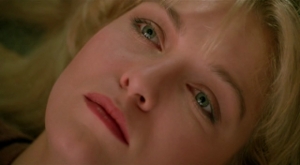
Twin Peaks was a American TV show I never watched because it aired on ABC. Let me explain.
In the early-90s, even in the days before Disney bought them out and began sanitizing everything for the protection of Uncle Walt’s cryogentically frozen head, ABC was the TV network for losers. The rest of us watched NBC or CBS because that’s where all the good shows lived. ABC’s only claim to fame at the time were re-runs of the original Star Trek which aired at 10 o’clock on Sunday morning, allowing me to call these broadcasts “Church.” If we wanted to be around our parents we watched Cheers and if we wanted to send them fleeing from the room we watched Fox. Why on earth would we bother channel surfing over to ABC?
Yet enough of us did to warrant two seasons worth of Twin Peaks and this one theatrical film…which even the series’ fans treat like the slobbering, mutated member of the family most people lock up in attics and feed stray salesmen. Among other things, this means Fire Walk With Me falls into my purview…and it’s taken me this long to figure out Fire is nominally a prequel to the proper series. Meaning any ignorant newcomer would do well to watch it first…right?
I know what you’re going to say: Ha! Wrong, dogbreath! Eat it, you sanctimonious, faux-intellectual Internet scribbler. Thou have proved thyself unworthy to experience the surreal glory that is David Lynch.
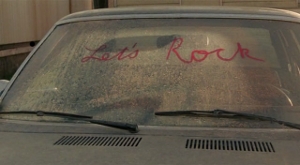
Be that as it may, let’s meet FBI Special Agent Chet Desmond (Chris Isaak), who’s sent out to the little town of Deer Lake, Oregon, to investigate the murder of a waitress named Teresa Banks (Pamela Gidley). A young Kiefer Sutherland accompanies him, playing Scully to his Mulder, and over the course of thirty-five minutes our two Agents find exactly fuck-all…save for the usual obstinate local law enforcement types who bristle at the sight of Feds…a single letter, somehow shoved under Teressa Banks’ fingernail…and an emerald ring that was on her finger before she died and now sits beneath someone else’s trailer park home…
As soon as Agent Desmond reaches for the ring the film fades to black. Cut to Philadelphia, where Desmond’s boss, Gordon (our director, David Lynch) and his co-Agent Dale Cooper (Kyle MacLachlan, reprising his role from the series) struggle with the sudden reappearance of one Agent Phillip Jeffries (played by one David Bowie). Jeffries has apparently “been gone two years,” and now returned to insist that “we live inside a dream,” which is certainly true enough on its face. But strap on your helmets, true believers: time for Lynch’s patented, gratuitous audience-headfucking to begin in earnest.
The film dissolves into a static fuzz, as if God’s hacking the signal from a pirate station somewhere out in Philadelphia’s ‘burbs. On the other side of this static we see a scene designed to be patently inscrutable to non-fans of the series or Mr. Lynch’s greater body of work. Inside, we see a Red Room and a Black, both filled with esoteric characters who’ll reappear throughout the film and throughout the series as a whole (I’m told). Apart from adding an inscrutable layer of weirdness to everything, this montage provides a handy, relatively-inexpensive way for Jeffries to suddenly disappear from Gordon’s office. The front desk insists he was never in the building at all, though the hallway security footage indicates otherwise.
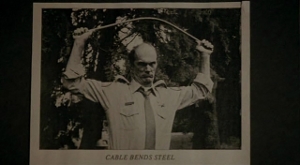
But never mind the Mystery of the Disappearing Rock Star. It seems Chet Desmond’s disappeared as well. Gordon charges Agent Cooper with solving that groovy little Mystery. Cooper fails…but, “The letter that was extracted from beneath the fingernail of Teresa Banks gives me the feeling that the killer will strike again.” Dun-dun-DUN! Such scintillating dialogue, this film. Oh, how ever have I lived so long without basking in its Designated Genius?
Jumping ahead one year, the film finally moves us to the titular Washington town that will consume the rest of our attentions. There we meet the object of the series and the subject of the film, one Laura Palmer (Sheryl Lee): popular, all-American high school girl…with a bit of a nose candy habit, but hey…at least its not meth. She also has a boyfriend named James (James Marshall) whom she meets (naked) in the shower stalls. He mawkishly promises “I’ll never leave you, ever,” though something tells me he’s going to leave her very high and very dry by the end of – TITTIES!
Sorry…what was I saying?
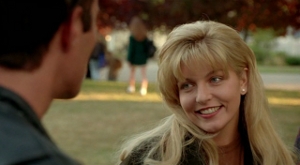
Oh, right. On the opposite end of the social spectrum, Laura has another admirer named Bobby (Dana Ashbrook), who’s trying so hard to be every late-80s teenage badass he might as well walk around with a great big POSER T-shirt, it’s bright-red arrow pointing up to his perpetually-scowling face. I kept waiting for my personal late-80s teenage badass superstar tag team of John (Breakfast Club) Bender, Brian (The Blob remake) Flagg, and Jason (Heathers) Dean to breach the walls between dimensions and give Bobby the beat down he so thoroughly deserves. But like the heroin I have to mainline to get through pictures like this, I waited in vein (rimshot!).
Back at home, Laura and her best friend Donna (Moira Kelly) debate the case of James v. Bobby. Since such girl-talk is boring no matter who’s behind the camera, Lynch’s script soon injects that trademark off-putting weirdness I’ve already come to know so well in these last thirty-nine minutes. Check out this exchange:
Donna: Do you think that if you were falling in space… that you’d slow down after a while, or go faster and faster?
Laura: Faster and faster… until after a while you wouldn’t feel anything… and then your body would just burst into fire…forever…and the angel’s wouldn’t help you, ’cause they’ve all gone away…
Back home, Laura discovers pages have been ripped from her “secret” diary (as opposed to her “public” one, I guess). Rather than blame her mom like a sensible young woman, Laura takes the mystery to her other friend, perpetual shut-in and Meals on Wheels recipient Harold (Lenny von Dohlen). Her prime suspect in the Case of the Disappearing Diary pages is someone…or something…she calls Bob. “Isn’t that the name of her suitor, the poser?” I wondered aloud to my empty Batcave. Yes, yet it is…but it quickly becomes apparent that Laura means a very different Bob (played by Frank Silva), whom we saw in the static haze around Bowie’s brief appearance.
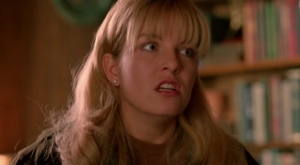
This Bob’s been “having” Laura since she was twelve years old and lately stated his intention to “be me, or he’ll kill me.” (Jesus; sounds like Bob could form some kind of international child-raping club with Dr. Hobbes from Shivers.) For no particularly reason, here Laura grabs onto Harold and speaks the film’s subtitle to him in a raspy, scratchy voice that (maybe) just might be Bob’s…before (understandably) freaking out and leaving Harold as she found him. He’ll never reappear in the film and my research indicates that this scene only exists to chestbump established series continuity.
Oddly enough, it might also provide a key to the whole damn film. A…”Lynch-pin,” you might say…if you were attempting to illicit groans from your audience. Let’s see where the process of association takes us…”fire walk with me”…firewalking. Symbolic of purification. Assertion of control, both over the physical universe and one’s bodily systems. Not just control, but dominance. Conquest. Ah-ha! Can’t fool me with all this weirdness-for-its-own-sake, Lynch! I’m on to your ass, boy! I know an Exorcist rip-off when I see one.
Except that would make too much damn sense. The film itself undermines this when, as Laura’s loading the day’s Meals on Wheels, an old woman (whom we also saw in the static haze surrounding Bowie) gives Laura a picture to hang on her wall. The old woman’s pint-sized, masked companion tells Laura “the man behind the mask” is looking for her diary. Rushing home, Laura meets Bob (or BOB as I’m apparently supposed to type it, though typing anything in all-caps gives the impression that I’m SHOUTING) in a scene that cries out for a grotesque facial morph effect of the kind far, far beyond Fire Walk With Me‘s time or budget.
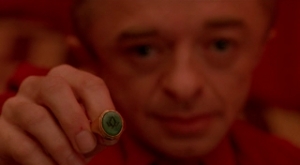
Rushing outside, Laura hides in a bush and takes a good stab at watering the grass with tears…when her father emerges from the house. “It’s not him,” she insists, pounding the ground. Honestly, hon, it’s probably all that wicked cocaine you’ve been snorting. Though, if the following scene with Laura’s father, Leland Palmer (Ray Wise), is any indication, it could just be good, old-fashioned family schizophrenia finally kicking in.
As Laura’s story unfolds it becomes abundantly clear that she’s living a double life: small-town America girl by day, coke-addled frequenter of the Bang Bang Bar by night. It also becomes apparent that she has very good reason to be this emotionally unstable, that multiple personality syndrome may be a Palmer family tradition, and that the whole appeal of Twin Peaks lies in its unflinching dramatization of our modern cultural insanity. The banally evil exterior routine of the Palmer family conceals a chaotically evil interior life that’s rotting away at each and every single one of them. Laura’s case is just the most acute due to her suffering the most acute traumas.
Laura’s story’s more than strong enough to support its own weight, powered by a cast of competent professionals capable of supplying their own motivations (since Lynch is notoriously mum with his actors…rather like another famous “visionary” director I know…who once offered Lynch the chance to direct a little film of his called Return of the Jedi…thank God Lynch turned him down). Get to the hour and forty minute mark and you’ll be inexplicably compelled the follow the story through to its symbolism-laden end.
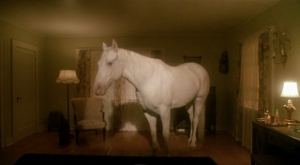
But the story only exists so Lynch might indulge himself and skullfuck us with dream sequences, series in-jokes, flashbacks, wobbly cutaway shots of cloud-wreathed moons and gray, Northwestern skies. All of this acts like the padding around a self-defense class volunteer and its protected Lynch from critical nut-shots for far, far too long.
I get why he’s worshiped as a “visionary” filmmaker. Critics of modern Hollywood spend most of their time in a gray haze, watching flat, boring films go through an elaborate pantomime routine that serves no other purpose than to disguise black void lurking inside their expensive, glossy shells. Imagine if you were trapped in a vault full of Cadbury Creme Eggs and, after eating a few dozen, discovered a good three out of five of them contained doorways to sunken R’lyeh, where dead Cthulhu waits dreaming. In such a perpetual nightmare of stagnant, preprocessed ideas and self-enforced solitude, the critic is completely within his rights to seize upon the first purposefully obtuse thing he finds and declare it “Ah verk of Ahrt!” Where do you think Western anime fans come from? Mars?
By the same token, I’m completely within my rights to call such “works of art” complete wastes of my time. Who (besides me) pauses a film every five minutes just to check something against Freud’s Interpretation of Dreams? Check out that white horse over there. It appears in Laura’s Mom’s bedroom as she drifts off into her own drug-induced stupor. Do you get it? Because if you don’t that horse only serves to pull you out of the narrative as your brain frantically grapples with that eternal question: “…the fuck?” Scenes like this have earned Lynch his reputation as a surrealist, but he’s nothing of the sort. Real surrealists were revolutionaries, and Lynch is nothing more or less than an absurdly-lucky film school grad, lacking the courage to depict rural America’s abusive, brutal underbelly without all of this bullshit artifice.
Of course, a real Freudian would insist that all art objects (including movies) are creations of the all-too-conscious ego, and any artist who says otherwise is a deluded fool so devoid of ideas he’s got to strip mine Uncle Siggy’s. Thankfully, I despise Freudians. That’s how I know they’re right about this: when even I agree with my natural predators (and Freudians are nothing if not lepidopterists of the unconscious – gassing every beautiful artifact they find before pinning it to a board, the better to shove it in a drawer and allow it to gather dust) they must have a good point buried somewhere in their arguments.
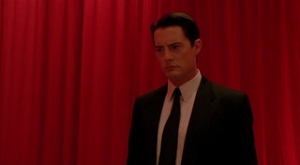
The point is this: film is a far too conscious, far too linear medium to be of any real value to the Surrealist revolutionary project (in so much as such a thing actually exists) because what makes a good film will not necessarily make a good surrealist work of art. Good films weave their symbolism into the narrative. Lynch (and a lot of his followers) use it to bludgeon their narrative into a dazed torpor before wrapping it in weighted plastic and tossing it into the Skagit River, there to be carried blissfully out to sea.
Still, Twin Peaks doesn’t resort to this as much as Lynch’s later films, so I’m inclined to give it a pass for actually trying to tell a coherent story. The performances are all immanently believable once I got over the fact Sheryl Lee is patently not a teenager. I even enjoyed her two-faced turn as Our Tragic Hero. She’s complex and conflicted enough to hold my interest through the show, especially since Laura’s inconsistent behavior is perhaps the entire point. Ray Wise also does a great turn as Laura’s oh-so-cracked father, proof that soap operas used to hire actual actors back in the early-80s.
All in all it’s a moody, atmospheric, stick-in-your-head kind of film, backed by a great score and peppered with the occasional striking image. It presents a fairly-accurate portrayal of hypocritical Americana that’s thankfully glamor- and sentiment-free…apart from those things about which Lynch can’t help himself. If that’s enough for you, have at it. And if not…watch the series instead. Had I bothered to do that I might’ve received this film with the kind of reverence that Moses gave to God’s Commandments. Or I would’ve despised it with all my fiber. It is, after all, a prequel…and we all know what those are like…right?
![]()
![]()
![]()

yup. Glad I missed this one. Spent better time reading bad books.
All things considered, it’s really not that bad. Just a bit…incoherent. But hey, that’s Chinatown. Or Twin Peaks, WA.
Unfortunately, this movie is one of Lynch’s below-par works. The TV show was much better, and I think I read somewhere that he only did this movie because of a studio contract. I’ve found most of the movies of his that I have seen pretty effective, even though yes, he tends to work off the vibe of “what the hell did I just watch? And why am I so disturbed?”
And that really could work if the disturbing “what the hell” proved interesting enough to hold my interest, and powerful enough to withstand my brain’s irrepressible habit of taking stories apart so I can see how they work…or if they work at all. Lynch always struck me as one of those filmmakers who has great ideas. But it seems that – somewhere around the time he did this picture – he lost all patience for assembling them into straightforward stories. So we get the patently-inexplicable pseudo-narratives of Lost Highway and Mulholland Drive, movies so off-putting and weird professional critics had no choice but to love them.
For me, though, nothing Lynch does will ever rival Dune. At least back then he deployed sheer wackiness in the service of a recognizable heroes journey…and gave me yet another opportunity to complain about how crazed directors will (inevitably and always) fuck up good books in the process of “translating” them to screen.
I don’t know, I’ve seen Lost Highway at least three times and I still find it effectively disturbing. The scene of the guy with the phone is one of the creepiest things I have ever come across.
Now on that we can agree completely. (“It’s been a pleasure talking to you.”) A lot of Lynch’s later flicks feel like that: scenes that work perfectly well in isolation, vignettes that, for me, never quite congeal into a story I can wrap my head around without doing hours of supplementary reading. Not that there’s anything wrong with that, I just don’t find my enjoyment of the films themselves to be much enhanced.
Oddly enough, watching Fire Walk With Me first had exactly the opposite effect on my enjoyment to the proper Twin Peaks series. With the mystery solved, I experienced none of the rampant frustration I found in contemporary critiques of the series and got to really settle in and enjoy what was probably the series’ greater point and its most interesting aspect: the layers of interlocking relationships creating the town itself, along with whatever evil might lurk there. It’s one of the best Small Haunted Town stories I’ve ever seen this side of Stephen King’s Maine or Dean Koontz’s American southwest.
I saw the series first and then the movie. Having lived in small towns, (and in Idaho, which is a nextdoor neighbor to Washington) so much of it was very familiar to me. Actually, Lost Highway does have a story. The main message is in a throwaway line at the very beginning where our “hero” explains to cops why he doesn’t like cameras “I like to remember things the way I want to remember them, not necessarily how they happened.” Once you have that, you’ll know the basic storyline. Admittedly, there is still a lot going on that I still haven’t figured, but for me that’s part of the fun.
I’ve read your website for some years now. Keep up the good work.
One of the funniest reviews I’ve ever read 🙂 Thanks for the laughs and a great write-up. Btw, I just finished watching the series, followed by the movie, and enjoyed the series so much more – more humor and soap opera parody.
You’re welcome. We do what we can.
Sorry, what were you saying? We got interrupted by some smart ass taking over the bandwidth. There was a humming on the line. It interrupted the, um, STORY, or something. But it was a lot more interesting listening to the BUZZ, at least once I put my ear to the ground.
And opened my heart.
“Real surrealists were revolutionaries, and Lynch is nothing more or less than an absurdly-lucky film school grad, lacking the courage to depict rural America’s abusive, brutal underbelly without all of this bullshit artifice.”
dude, i LIKE your stuff (the WRITTEN reviews, anyway), but this is the ignorant comment of someone who’s never seen Lynch’s masterpiece “Blue Velvet”–the LEAST Surreal of his early works. TRY to see it on a big screen so you can appreciate Dennis Hopper’s GREATEST PERFORMANCE as the Scariest Cinematic Monster EVER. i shit you not.
also, why no “The Dark Knight” review?? afraid to to alienate yer fanbase reviewing one the shittiest Batman movies of all time?
it’s hard to list all the reasons i think TDK is a middlebrow farrago of pseudo-intellectual bullshit without sounding condescending….
for what it’s worth, i LOVE “Big Trouble In Little China”* cuz i am NOT an effete snob. it’s the monumentally overbearing PRETENTIOUSNESS of TDK that wrecks it for me. also, i’ll NEVER get over how much i FUCKING HATE that “Batman voice.” i feel that way about MOST of Nolan’s output, and you can throw almost everything the Coen’s have done in there, too.
see what i mean about “condescending”….
i can’t watch “Darkman” even though i think “Evil Dead II” is one of the Best Horror Movies EVER, because THE GUY HAS NO LIPS. i”m forced to go “No. Fucking. WAY” EVERY time he has a line of dialogue. at least Dr. Phibes had his voice box…
* and “The Thing” is the Best Remake EVER.
DISCLAIMER: i’m old enough to have seen the original Batman TV series WHEN IT PREMIERED on ABC. really dug it as a 6 year-year-old…
My favorite directors are Bunuel, Herzog, Kubrick, Lynch, Roeg, Gilliam and Allen. really like some of Ringo Lam’s HK stuff, too. might as well throw in Fellini, Godard and Bergman while i’m at it.
PS. here’s one of mine–why “Contact” is maybe the most Morally Reprehensible Movie EVER:
https://youtu.be/Q-5bvX12Rp8
poor Carl…..